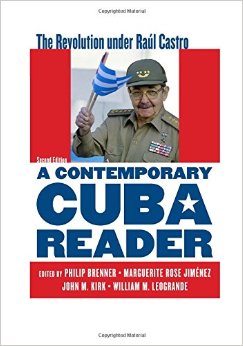[tweetmeme source=”connergo” only_single=false]
All my friends are talkin’ about leavin’, about leavin’
So goes the little pop ditty in heavy rotation on one of the satellite radio stations I favor. I’d bet my life Cuba never crossed the songwriter’s mind, but it so easily could have been written by my friend Alma, my prima Anabel, or my colleague Jorge.
Or me.
The song is entitled Ghosts and we’re surrounded by them here as certainly as the water which hems us in, as omnipresent and nebulous as the bureaucracy that hobbles Cuban greatness.
Can you hear me sighing? Crying? Thankfully not, but somewhere out there, not too far from where you read and where I write, there’s a Cuban pining for the friends that have left or for those they’ve left behind.
Or not.
Emigration is a little like death: everyone has their own way of grieving and no one has the right to judge – least of all me with the relative freedom of movement I enjoy. Some people block out departed loved ones as soon as that exit permit is stamped or the fast boat slips silently from shore. Until they’re due back for a visit, in which case copious gifts are expected. And they always do. Return, because the pull of this patria is too strong to resist indefinitely and bear gifts because the guilt – self-imposed and otherwise – of leaving is heavy. Besides, what better way to prove the grass is indeed greener than to come loaded with loot? (see note 1)
What it amounts to is ‘out of sight, out of mind.’ It’s a wholly common coping mechanism here, in fact. Or rather than a way to cope, it’s simply part of the cultural sofrito. After all, many a liaison – and even marriages – (mal)function due to ‘out of sight out of mind,’ and the related ‘what you don’t know won’t hurt you.’ Until you do, but that’s another story.
Some Cubans, meanwhile, go to the other extreme: they pine and fret and share each morsel of news with every person they meet. Iraida got her driver’s license; Alain saw his first St Patrick’s Day parade; Yoselvis likes Burger King, McDonald’s not so much. This is my approach for keeping close everyone I left behind in my own émigré drama. Willingly taking leave of a lifetime of friendships – most Cubans don’t realize we share this in common.
Emigration is a knotty business, muddled by politics vs. agency, needs vs. desires, illusions and disenchantment, resignation, empowerment, circumstance and happenstance. And I’ve faced a lot of loss and separation on this end. Many of my Cuban friends and family – relationships I’ve fed and nurtured over the past 10 years with all the creativity and passion my heart allows – are leaving. Invariably, I’m tipped off when they suddenly start speaking English and going to every doctor they can, even the dentist.
The details of leaving vary, but the reasons rarely do. Frustrated and fed up, my friends want meaningful work at a dignified salary; yearn to improve their families’ station; and itch to experience something beyond their block, barrio, or province. A leave-taker myself, and with what I know beyond this city, island, and hemisphere, our emigration conversations have been in-depth and interesting.
My 20-something friends ache for independence – from mom and the state – though many are clearly unprepared for the reality fleeing the nest and flying solo imply. My 40-something friends, meanwhile, are tired. Tired of only having water un día sí, un día no; tired of waiting on the bus, permissions, and promises that may never materialize; tired of hunger and boredom and heat without respite, tired of the shortages and struggle and slogans – the endless luchita that erodes the will to go on blackout by blackout.
Just today, after a rash of events that included death of the family dog, a trip to the pediatric hospital and stint at the police station (neither resulting in prolonged care or detention por suerte), a friend reached the end of her rope: “I’m a revolutionary, but there are limits to what a person can take. I can’t take any more. I’m ready to get on any lancha or plane to get me out of here.”
I relate to both groups: fiercely independent, I began working at 13 and left home four years later, so I get my young friends’ anti-dependence stance. What trips me up and out, though, is how they replicate the precise behavior they condemn: they don’t participate in any community endeavors like the block association, because they say the block association doesn’t get anything done. In turn, the association blames ineffectual municipal authorities, who blame overworked and gridlocked provincial authorities and on and on goes the blame game up the hierarchy in a cycle of non-action.
I ask if a renovation or re-thinking of these mechanisms is possible (obviously it’s desirable), but they give me ten reasons why it isn’t practical. When I suggest that they volunteer or campaign for those positions in local government where they might affect change, I get the same response. It’s a vicious cycle and self-fulfilling prophecy a la vez: things won’t get better because the people charged with improvements are ineffective and/or shackled so why even deign to try to fix what’s broken or work towards positive change? So they cross their arms and give in to the inertia – while eating grandma’s home cooking with provisions provided by her and the state, in clothes washed by mom, after which they shower in a bathroom they’ve probably never scrubbed themselves. They are resigned, leisurely.
I know that sounds harsh and as if I’ve written them off. But I feel for this generation. They did get the fuzzy end of the revolutionary lollipop after all. They were born into the hardship of the Special Period, just missing the halcyon Eastern Bloc boom, when you could take your honey out for dinner and dancing on the average salary. The emotional, exuberant revolutionary hey day when the entire country put their backs and minds into creating a more just, equitable society was also before their time. To boot, their lives were proscribed by all kinds of dubious innovations like ‘emerging teachers’, the camello, and reggaetón (see note 2).
But there have been positive changes in their lifetimes, too, and when I ask them about the relaxation of restrictions on private property and enterprise or the very public push for full integration of LGBT Cubans into society for instance, they say ‘too little, too late’ or cite non-causal factors for such strides. Many didn’t participate in the national debates that generated these changes, nor have they read or heard Raul’s speeches specifically dealing with these issues – and even thornier ones like travel and the meager salary problem.
When I point out that not all change is good and ask if they’re prepared to take the good with the bad, they say yes – reflexively. Change for the sake of change is their position. And it leaves me wondering what they believe in; I’m coming to think that even if they know, they aren’t prepared to fight for it.
On the whole, my 40-something friends are nostalgic for the late 80s and agree much has changed since then – for good and not so. Back then, you couldn’t even dream of procuring an exit permit to travel abroad (a restriction the majority believes should be lifted, though this involves complexities not everyone is willing or able to recognize). And they praise recent changes, though often such praise isn’t forthcoming without prompting. It makes their resignation doubly troubling – they have the historical context of how great this country was and the maturity to take the longer view (see note 3) but still they want out. When I ask these friends what they would change, they mention freedom to travel (something my own country doesn’t extend its own citizens – another thing we share in common) and less bureaucracy. Some say they want Liberty, capital L.
Mercurial, that liberty thing. Do they realize tyranny comes in many flavors? And that consumer capitalism, powered by its ‘save yourself if you can’ underpinnings, is among the most bitter? And if you can’t save yourself? Tough luck.
For many, the choice is reduced to resignation or emigration. Neither of which will deliver the liberty or change they so desire, I’m afraid. To be clear: I wholeheartedly support my friends working towards leaving; after all, I did it myself, I left my country and I can leave this one too when I want to. But I miss them something awful once they’re gone.
To the resigned, I say – if you’re going to stick around, stick up for what you believe in. A better Cuba.
Notes
1. OK, so maybe that’s a little crass. Cubans know better than anyone how hard life is here and generally have a genuine desire to help out those back home. Still, doubt creeps in when I learn about the rent-a-bling businesses in southern Florida which lease chunky gold-plated watches, chains thick enough to moor a boat, and rings for every finger to Cubans returning to the island. These doubts are reinforced when I turn sad watching family ruptures at the airport and friends say: ‘that’s all a show, muchacha. Take it with a grain of salt.’
2. This program trained massive amounts of teachers in the minimum amount of time. The idea was to improve the teacher to student ratio, which took a nosedive as older, more experienced teachers retired – often to offer private, complimentary classes to those students who could afford them. More often than not, these emerging teachers weren’t much older than their charges and depended on videotapes and other teaching aides to compensate for their lack of experience. By all accounts, it wasn’t a good approach. Camellos were double-humped hulks pulled by big rig cabs that held over 300 passengers when packed. You still see them in the provinces, but they’ve been phased out in Havana. If you don’t know what reggaetón is, I envy you.
3. Difficulty in taking the long view is not just limited to Cuban youth, I’ve found.













This is interesting because I have seen so much frustration and resentment amongst younger people in Cuba, but at the same time a complete resignation and apathy to do anything to change things for the better. Its probably easy for me to say, as a student I was forever going on anti-war marches, campaigning against this that or the other and in my naivety and youth at least felt I was making a difference….although the inequalities I was fighting to stop were often not my own. I think this is a right of passage for free thinking young people and the power to shape your own future should be a universal right. Young Cubans do not feel like they have the power or capacity to be in charge of their futures and are trapped in a repressive, worn out political regime of which they feel they have no control. I think many are prepared to stay in Cuba unhappy but proud. Like them, I hope there is a change for the better in the not too distance future.
There’s a cuban saying: sleeping shrimp get carried away in the river’s current.
Until they start participating more and complaining less, they will be those sleeping shrimp.
Another well written truthfull article, mi hija.
“They aren’t prepared to fight for it.”.
How true. There is not one person under the age of 30 who, in my and my older friend’s estimation, that would survive through the special period. Could you see any of your younger friends riding on a bicycle 29 kilometres one-way to work in a field for what they could carry home on their backs? Could you see them going to the fields to collect dry cow dung and hauling it home in a sack so they have a small fire to cook on that night? Could you see them spend hours and hours diving, diving again, trying to catch small fish or snails to feed their family? Walking for half a day to pick the special plants, walking home again, boiling it, straining it again and again to get one small bar of soap? Never. We adults who have lived in that generation, in my humble opinion, have spoiled the younger Cubanos who now want everything, now, without having to work or sacrifice for it.
And why is it when Cubans return home for a visit, after complaining for years about the lack of medical supplies and medicine, school supplies, sheets on the bed, graft, etc, choose to bring back t.v’s, stereos, and other non-essential items instead of trying to provide humanitarian releif, leaving that up to the Yumas? Just look at all the emigrees, spending money on big rental cars, buying beer for all their friends night after night, taking friends out to supper, wasting money, playing the big shot, while aunts and uncles and grandmothers and grandfathers who have helped raise them, sacrificed so they had something to eat when they went hungry themselves, have no shoes, no sheets, a broken fridge and nothing to put in it.
I salute my doctor and teacher friends and family in Cuba who, when asked if they would ever leave , say “No. It is my personal duty to stay and help my brothers and sisters”. They are the true heroes, choosing patiotism and love over the almighty dollar. To run away is to deny all the sacrifices our elders have made for our own selfish reasons.
AMEN!
(responding to Candysita) wow. I am (maybe you are too) one of those emigrees and I, same as many of my Cuban friends here, do not come back to show off, or to spend money that we do not have buying beers for friends. We do send money to our families, and we bring back things trivial and not so trivial. There is a heavy whiff of judgment in your post. I know that some Cubans come back with the heavy chains and the pictures next to a leased car to show their “achievements” and to say like you said above “look at ALL the emigrees”. A friend of mine is working 2 jobs to send money to her sister to fix the roof of her small apartment, others deprive themselves of things they could get here, to provide for a family back in Cuba.
I’m 41 years old, born in 1971 and my generation and the one before are just sick and tired of having the responsibility and all that weight on my shoulders. Unfortunately for me, I do not believe in reincarnation, I have only 1 life and want to live mine. And I’m not talking about bigger tvs here. The same reason irish, italian, polish and russians emigrees had to come to North America, a chance at a better life. Who are we to judge someone who decides not to stay and fight and effect small changes so that maybe, just maybe, 20 years from now, something will happen?
And to Conner: I do understand your frustration with all the complaints when we do nothing. But it’s been more than 50 years of knowing how things work and we are TIRED. At least I am. I don’t have any “duty” to stay and help my brothers and sisters. I did my duty, I worked in the fields during escuela al campo, i participated in all CDR activities, including taking me out of school to yell at those who left, I went to school far from my family, taught classes in Secondary and High School, all to build that “hombre nuevo” that never came to be. Tired, just tired. And I know that I’m not a hero and that is ok.
Hola Dany. As with all my posts: I don’t mean to imply that ALL Cubans are asi o asado, but the stereotype applies to many and with reason: folks who leave friends, family and patria have a huge cross to bear and many have to “prove” they’ve made the right decision by flashing wealth when they come back.
I thought I was very clear in the post about two points you bring up: 1) Im not judging and 2) many of my friends are leaving because they are TIRED. You are very lucky (maybe that’s not the word?) not to feel a duty to take care of your brothers and sisters.
PS – I bet you didn’t only work at the escuela del campo! jajajaja.
Very good article Conner, it is so true what you write. And it leaves one sad. I do not know how many that leave daily , but it must be quite a few. Some do come back, and some prefer to live in Cuba after obtaining their residence ” afuera”.
Among the young ones ( 20s-30s) it is always a hot topic, ” se fue fulano”, “se fueron unos cuantos de mi barrio, y todos legaron bien”, .. and more ones want to go . They sell their belongings and head for the fast boats ( must be big business ).
And like you point out, those are the ones who often don’t do anything to better the society they actually live in: Cuba. Going to “Yuma” has become the only solution to their “problems”.
(Personally I think ” the privileges U.S gives the Cubans” are doing much harm, and are unfair to other immigrants, but that is another discussion ).
Many of my 25-35 year old friends have watched their entire cohort of consortes leave – sad, as you say. And also sad is that not everyone that leaves DOES arrive well – it can be a dangerous trip across the straits/mexican border. And you’re absolutely right: the US immigration policy specifically for Cubans known as “wet foot, dry foot” whereby Cubans who put a toe on US soil get (almost) immediate residence
So you are coming to know that Cubans, especially the young, are not willing to fight for what they want, if they even knew what it is they do want?
Congratulations- you now know the carneros de Cuba for who they truly are.
I was in a Wal-Mart about a month ago after coming back to the States from Cuba and was behind a woman who had about four kids, all clearly unwashed and skinny, trying to pay for her groceries and laundry detergent with a combination of cash and two or three credit cards, probably taking a lunch break from one of the two or three jobs she’s working (for minimum wage, without health/dental benefits) to make ends meet. I couldn’t help but think that, although most people in Cuba have pretty tough lives, who is to say that everyone’s life in the U.S. is THAT much better?
Obviously, I can’t make generalizations about life in either country, but I’m just pointing out that the U.S. is not necessarily all milk and honey.
Thanks for another well-written, informative and thought-provoking post!
Well, if she decided to have four kids without the financial means to raise them, who is to blame for her hardships?
If she has four children and no husband, she qualifies for Social Security Assistance for each child, and all the kids also get health care insurance from the government.
Two houses from where I live, there is a Dominican woman who has 10 children. She has Plan 8, that pays for her house (she has a two stories house with six rooms), she pays a only symbolic value for her electricity and gas, and gets also food stamps and cash for each child. She does not work, and lives of her children. So may be that woman in Walmart does not know how to milk the system.
There is a saying in Mexico, where I live, “Salir de Guatemala y meterse en guatepeor”. Unfortunately, or maybe fortunately, Cubans have no idea of the state of the world economy. Many people in Spain and Greece are much worse off than the average Cuban when it comes to basic nessities of live. Nor can the Cubans see the videos of the riots in the above countries. And, the US is in for more problems once the election is over and Obama wins. He will not have to worry about a second term and the gloves will come off. Not to forget that more than half of Mexico, mostly in the North, is uninhabitable due to the Narco violence. Sometimes it is better to stay put in Guatemala.
Hiya Jake. We also have that saying, but shorten it (a lo cubano) to: de Guatemala a Guatepeor.
Cubans do, in fact, know what’s going on with the global economy. It’s on the news and in the papers every day. What’s interesting to me, especially, are those Cubans returning to the island from Spain and even the US since things have tanked economically. The returning Cubans story is the one I really want to write but it’s tricky for many reasons.
thanks for stopping by.
Yes, people are returning. It is a dicey issue all the way around. I think you will find that as things get more “interesting” in the developed world, you will see more and more people on the old door step. If you want to know what is really going on read a blog called Zerohedge Fund, if you can access it. Spain, once the end all, is a total wreck. Catalonia is ready to break away and if that happens, the basques are next.
I am 65 years old and have lived outside the US for 30 years in five different countries. I assure you that what is coming down the pike is way beyond what people expect. Cuba may well be one of the best places to be in the world. The degree of class savagery is reaching the point of around 1935 and we know what happened next.
Cuba may well be one of the best places to be in the world.
Spot on, especially given the timing of my move from New York City: just after 9-11-01. No place feels safer and saner than Cuba.
“And if you can’t save yourself? Tough luck”
This is the scary reality of the blame the victim approach to public policy – looks like Romney has been outed but here in Oz we may be in for it next election.
As an émigré you have been able to work up your coping mechanisms, and as you point out you have the freedom to travel, unlike those left behind in Cuba. I have been so busy wondering how my bloke will cope with being here that I have given little thought to how his family will cope with his departure – an indication of my thought processes, the difference between cultures.
The learned helplessness that is endemic in an oppressed society is so difficult to overcome – I have met it here with Indigenous people, in the Middle East working with Palestinians, and more latterly in Cuba. And it is difficult to see it lessening in the short term; economic reforms will widen the gap, and those least able to cope will find even more reason to follow the quick fix.
This post added so much depth to the too-quick interactions I had when I visited Cuba. The crowds of Cubans pressed against the airport gates noisily watching for a glimpse of arriving family, the musician who slipped me his daughter’s e-mail address so I could e-mail her in Miami because he could not, the gold chain around my friend’s neck that somehow connected him to the brother in the U.S. who had sent it…I caught these glimpses of the sadness and inaction that you describe, but your summary makes it so much clearer.
It’s interesting how much your description of the Cuban inertia sounded like complaints/explanations about Americans’ tendency to not show up to vote.
Hola Beth. Thanks for your thoughts. There are many parallels between Cuban/US inertia. Makes me wonder: what IS the best way to encourage civil participation and responsibility?
I wish I knew the answer – even an overpriced degree in grassroots outreach didn’t help me find it. I think participation has to be connected to both an understanding that political decisions impact you, and a belief that your action can influence the outcome at least a little. In America, we often fail on achieving both; politics never seem to change and unless the conversation is directly related to something like student loans students don’t take time to understand how discussions directly impact them.
If my theory is at least slightly accurate, it seems that perhaps Cubans could grow frustrated on the second part? Does activity in the local government structure of Cuba ever influence outcomes or decisions? I was disappointed that I didn’t get to learn more about the CDRs in communities and how participation in the meetings can help get issues – at least small ones – addressed, so I’m interested in your thoughts on whether participation leads to change or just frustration.
Hola. I think you make some good points. What puzzles and frustrates me is that a lot of Cubans feel/say “I can’t influence policy/outcomes/decisions” but without actually trying/participating. So they’re essentially talking out of their assholes. I did participate in the national debates (held on local, regional, provincial levels, in CDRs, workplaces, party nuclei) that led to the economic changes we’re now seeing. An exercise in futility? Maybe, but only those who know how it unfolded (ie participated) can offer even a semi-informed, at least experiential, opinion.
CDRs are fascinating to me because Ive had personal experience in those that work well, poorly, and not at all. Not many Cubans have had this experience because people rarely move – entire generations, generation after generation, grow up in the same house, with the same CDR. This continuity might argue for more effective, local change, but it doesn’t (for many reasons, too complex to get into here). Much depends on who your representatives are and their levels of frustration, effectiveness, drive, influence, energy.
I would love to see a dialogue around revitalizing/redesigning CDRs to be more responsive to real issues. Not at all sure how that would be possible, but by chance, right after your comment came in, a freind sent me this quote from Victor Hugo:
“Not being heard is no reason for silence.”
I guess that’s part of what Im getting at in this post.
Love the Victor Hugo quote! It sure sums up the issue in a more noble way than my own mantra: those who don’t participate can’t bitch about the way things are.
Are people afraid to participate? I talked to every Cuban I possibly could in the short time I was there and I could never tell if they chose not to be politically involved because they didn’t want to or because they feared retaliation from those who disagreed with whatever position they took.
As an important sidenote, kudos to you for having a forum for this kind of informative conversation!
Im not sure its fear – Ive found Cubans to be among the bravest people around. Also, the whole “retaliation” thing is way overblown and is part of Cubans’ generalized paranoia. This is not to say that some people are not watched, followed, listened to, arrested, and detained, but really? The average consorte on the malecon or in the bar saying “this government sucks” or “is top heavy” or “is geriatric and has to go” is not going to face retaliation.
Thanks to you, my readers, for making this conversation possible. Saludos!
Not easy living in a country that people are constantly leaving. Jamaica has a high rate of migration. But Cuba’s rate is almost as high, even with the presumed greater difficulty of getting out. I think that living on an island drives people to get to new shores.- they feel claustrophobic after a while and just want to see what else is out there.
Not sure what the rates are for Jamaica OR Cuba – but Id be surprised if they were similar. There are a lot of factors at play – most importantly the US policy of wet foot, dry foot for Cubans: if they get to US shores, they are welcomed as residents. This encourages dangerous sea voyages (and negates the “presumed greater difficulty of getting out” – I assume you refer to the exit permit here).
You are absolutely right though: the psychological effect of living on an island is very real and causes claustrophobia and more. Ive written about this a bit and hope to include the nuts and bolts in my book.
I’m sure its difficult for you to watch people leave but I don’t think I can empathize with you. I love your blog and think that your perspective is fresh though sometimes very skewed. Judging a Cubana’s upbringing by commenting on how (mami washes her clothes or Mima did the cooking) is ridiculous. Isn’t Cuban culture what you so love about your adopted land. Mima and Mami are one and the same to a Cubanas and you are raised a specific way preCastro post Castro in the stated in Cuba it makes no difference this is how Cubans raise their children. I don’t think this has any baring on ones lack of participation in govt. I also think that just because people tell you they are believers in the govt doesn’t mean they really are. From my own personal experience I know that in Cuba people will tell you what they think they need to when it comes to govt and are also not really in touch with their personal opinions regarding politics since they are not very familiar with the ins and outs of day to day life elsewhere. You should know from your own conversations with people the misconceptions that exist about the EEUU and other countries.
Though you’ve been living in Cuba for many years and are married to a Cubano. You will never know the heartache of leaving Cuba, because you can come and go. You can judge those who left. But in doing so its not from a real perspective. You do not know how difficult it was for my fathers generation to leave Cuba. But what choice did they really have. People left for various reasons, be it political, financial you name it. They left by choice and by force. It makes me sick on so many levels when someone judges or tries to judge the rational of those who left. I think there is a huge misconception that all Cubans who left long ago are swimming in it and don’t help enough or are putting on a show when they come home. Perhaps the expectations back home are very high and very much misguided. Perhaps after so many generations of disconnect it is just too difficult to try to embrace those bonds or try to cultivate them. I know from personal experience the emotional ties that bind me to Cuba. But you’ve lived a brief period of self immersion in a culture that is so rich in history. That sometimes I think you take for granted what you see and though its great that you share your experience. I think it would benefit much for you to remember you can walk away at the drop of a hat and the people around you are living it your just sightseeing by choice.
Hey Evi
I hear you and agree with you on some points. The gender construct Cuban parents force on their children and the pattern of paternalism/dependency (ironically, the same thing many complain about vis-a-vis the state) Cubans tend to replicate with kids and underlings is not among them, however. I find no contradiction between loving all my Tatas and Tias and Mimas and Mamas and finding fault with replicating these constructs.
I specifically say Im the least able and last person to judge people leaving, I support my friends who choose to do so and recognize that people do it for very different reasons. I also acknowledge that I can walk away (but still have to get an exit permit). Not sure how you missed all that?
Also, I know all too well that Cubans tell you what they think you want to hear to get where/what they want; Ive even “codified” it.
But you can still come and go!! When I visit Cuba I’m denied an entry visa because of my last name and I’m denied acknowledgment of entry in the country. After they scour through my luggage and ask if I have any literature or contraband for distribution I’m then reminded that if I should break any laws the penalties are great. When I want to leave I have to spend hours having them figure out why they didn’t give me the proper entry papers. At least that was my last experience. As a Cubana, because thats my birthright through ancestry and blood It shouldn’t be so difficult to come and go.
Asi es: I can come and go, as I mention more than once in the post and again in my response to you. I know firsthand how arduous it is for Cuban Americans (and Cubans — the subject of this post after all) to figure out and procure the paperwork to travel. Sounds like this happened to you and Im sorry you had the headaches.
But “denied” an entry visa and “denied” acknowledgement of entry into the country…am I missing something? It sounds like you did visit Cuba?
Hi and thanks Conner- one comment re: professionals leaving Cuba. You mention that doctors and teachers choose to stay out of a sense of duty. One of my best Cuban friends, a doctor who runs a children’s clinic, has had close family members leave for Chile probably never to return, and last time we ate together (and drank, yes) he told me that he will not get permits to leave like his family because the state does not give permits to people who are necessary in Cuba. It is my guess that he has probably tried. A bit different story as to why he stays… And drinks…..
Hey Dan. Not sure where I mention that docs and teachers stay out of duty – this isn’t the whole of my experience, certainly not lately. I know a lot of doctors, fewer teachers, but these professionals too, are leaving (either on mission or permanently). It is true that certain professionals considered strategic for natl development and security (doctors and armed forces people, some engineers and I don’t know who else) have more hurdles to clear for obtaining the exit permit. In most cases, it is five years after working in their profession.
I don’t have a problem with this if this is how it works in practice (ie you can apply and have a good shot at the exit permit after 5 years): you receive a free medical/engineering/higher degree and then have to provide five years of service in return. This is not dissimilar from the teach-for-your-free-PhD system in the states. It’s a way to curb brain drain and I think more global south countries with strong education systems should consider similar strategies.
I wish your friend luck.
Sorry Conner- it was actually one of the earlier posters, Candysita, who mentioned the doctors and teachers staying out of a sense of duty, so my reply was directed to her as well as a part of the larger conversation…..
Right you are Dan, about professionals not being allowedd to leave, in one sense. But also, I know of at least 3 doctors who have left to work in other countries (Angola, Venezuela, etc ) and then defected.
Yes, defections of docs on medical mission happens, but much less than people may think: about 3% over the 45+ years of international cooperation. And this even given the active, aggressive program the US government (and US taxpayer money!) maintains to lure Cuban docs out of the countries where they’re working and to the US
All my friends fell in love while abroad. But dozens of others I know returned and your stats are correct.
Ah love. It moves mountains (and shatters illusions!)
Cuando un Pueblo Emigra los Gobernantes Sobran
http://socialismocubano.blogspot.com/2011/07/cuando-un-pueblo-emigra-los-gobernantes.html
I think that it all revolves that the Cuban government es una mierda.. because they were unable to maintain their promises in 50 +years….and still want to stick with an obsolete, controlled and repressive dictatorship model. There is Jose Marti quote that is the best description…. “When people migrate rules are worthless” or …. “Cuando el pueblo emigra los gobernantes sobran”
Again with the blame game; not my cup of tea.
In the interest of meaningful dialogue, dos preguntas:
1. What of the US’ role vis-a-vis Cuban emigration; and
2. To what promises do you refer that weren’t kept?
I am not sure why you want to live in Cuba. I have read through your blog and it is definitely some interesting reading. You obviously have a disdain for America, your birth country. So I am guessing living there, you have grown to distrust and dislike the US. Having recently visited Cuba, I don’t think I could be so brave, nor would want to live in a country that is obviously failing and may one day be subjected to mass US investment which will change the whole nature of what Cuba is today. I would not want to witness that. Do you ever thing of packing it in? I am not saying you must move back to the US, but from your recent blogs, it is really depressing to think that all the people living around want to move away from the place. It’s unsettling. America is far from perfect, as is all countries but Cuba really is a country so different than anywhere. This week Yoani Sanchez was arrested. They should have let that woman just re-emigrate.
Aloha Jeffrey; mahalo for stopping in.
I haven’t developed distrust, disdain and a dislike for the USA living in Cuba – I had all of that going on BEFORE I moved to Cuba. The bellicose reaction to 9-11; conflation of Iraq/Al Qaeda/OBL; and the Patriot Act were like nails in the coffin for me.
You say Cuba is “so obviously failing” – but according to whom and what criteria? I don’t think Cuba will be subjected to “mass US investment” – not if it can help it anyway. There have been positive inroads w diversification of trading partners and investment lately (Middle East, Brazil, Namibia, Angola) that aim to stave off this possibility. Im sorry if I gave the impression that all Cubans want to leave – this isn’t so; Ive just had several people close to me leave (and not all permanently it’s worth noting) lately and it has me down.
But not all the time and it ain’t all bad. To wit “why I want to live in Cuba”:
– https://hereishavana.wordpress.com/2012/01/12/how-to-cope-like-a-cuban/
– https://hereishavana.wordpress.com/2011/12/05/why-are-cuban-so-damn-good/
– https://hereishavana.wordpress.com/2011/11/11/let-me-count-the-ways/ (specifically addresses “why I love Cuba”)
– https://hereishavana.wordpress.com/2011/05/06/what-cubans-wont-say/
Yoani was detained as far as I understand, not arrested and Im not sure “that woman” wants to re-emigrate. After all, how would she make a living in the “real world?”
PS – I see your email has honolulu in the address; assuming you’re actually in HI, that’s about as far as you can be away from the US (literally and figuratively) and still be in the US!
Conner, thanks for your reply. Yes, I am in Honolulu and moved here a few years ago from rainy Seattle. I probably should have figured you had the disdain for the US before. I don’t have a problem with that. The fact that you could leave is the freedom we are offered as citizens of a free country. (I know people snicker at this, but we do have choices) I also sense your sadness in seeing friends leaving and planning to leave. I actually don’t know how you deal with that. That’s got to be tough. I enjoyed my trip to Cuba, but left the island feeling depressed from what I saw. So many people with an education and nothing to support them with that education. As for Cubans wanting to leave, I’d take a good guess that over half of young people would do anything to get out. It’s sad and it is what it is. I told a few young Cubans, honestly that America and other capitalistic nations are not paradise and they better be prepared to work their asses off to survive and hopefully succeed. The important thing is that in those countries there is hope, which Cuba has little of. I disagree with you on American investment. If Cuba, opened up, there would probably be all of the hotel chains, restaurants etc. popping up everywhere. I am not saying this is a good thing either. One thing, I liked about Seattle was the progressiveness of keeping local businesses vibrant, besides the Starbucks monster taking over. Anyway, I enjoy your blogs, you are definitely one person I’d like to sit down with over some rum and pick your brain and I’m sure we would have lots of disagreements which makes for fun convos. Has your significant other even been to the US?
Hello Conner, Thank You for writing this incredible blog. I’ve spent the day reading all of your posts since inception and just got your android app. Keep up the great work! Cheers
Hola Tony!
Thanks. I only post a couple of times a month, as Im sure you’ve noticed. To be sure you don’t miss one, I suggest you subscribe to the email alert. Next post, drafted today, on crime in Cuba.
Cheers.
The first thing I thought when I heard Cuba was lifting exit visa requirements was, “I wonder what Conner thinks about it!”
Viste? Several of my projections are bearing out – the exit permit and I tell you: Havana is crawling with cyclists. Our bike polo fiesta this past Sunday on our new court rocked!
Everyone is excited around here for the news. Que empiesan las travesias!
In response to your question. I have visited. I went to visit my family and definitely understand the difficulties associated with traveling in and out of Cuba. Yes you also read correctly I was not acknowledged upon entering the country was not given a visa and was told your here but we don’t acknowledge your entrance into the country, make sure you don’t break any laws. I stayed for a bit and when it came time to leave I had to spend hours in the airport for them to figure out what they did when they let me in and then I left. I honestly haven’t returned due to this experience.
Yikes. This reminds me: I should update my post on Annoying Cuban Habits to include random/rampant ineptitude.
Pingback: Apretando mi Corazon: Cuban Emigration | connergo's Blog
Pingback: Pushing Your Luck in Cuba | Here is Havana
Pingback: Conner’s Letra del Año | Here is Havana
Pingback: Living in Cuba - Cuban-American Marriages
Pingback: Conner Gorry on Living in Cuba as An American Ex Patriot